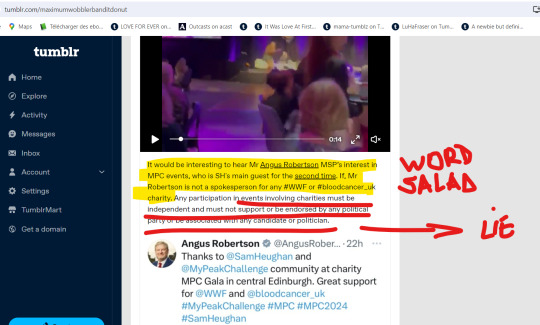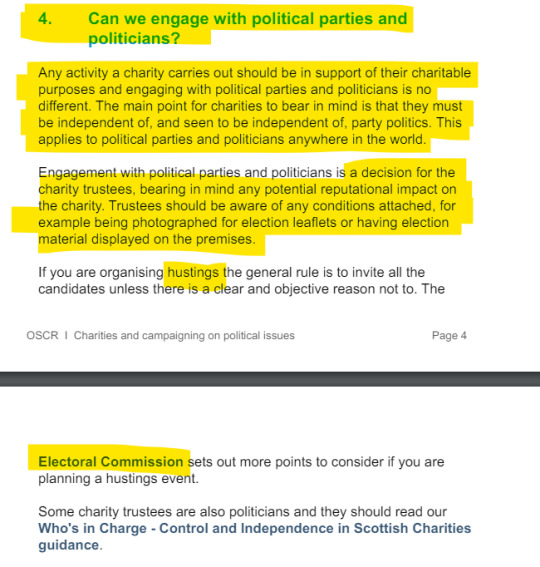#are the same in scottish proverbs?
Explore tagged Tumblr posts
Text
Charities and politics: the thin, red line
When you are a proven impostor and idiot and still you insist, it's time to remind you a simple Roman proverb: errare humanum est, perseverare diabolicum. In other, English, words: to err is human, but to persist is diabolical.
Or supremely stupid: your pick, Max.
This page is not into politics at all - and I explained why: this is a very familiar terrain to this blogger, who'd really like to enjoy her daily time off that particular kind of madding crowd. However, from time to time, reality manages to pierce the veil, such as today, when news of Humza Yousaf stepping down as Scottish First Minister made worldwide headlines - just a basic example: https://www.nytimes.com/2024/04/29/world/europe/scotland-humza-yousaf-resigns-snp.html
That does not mean that the whole Cabinet is bound to resign, unless next Wednesday's debate on a non confidence vote promoted by Scottish Labour is lost. By the way, non-Scottish Max.
Never mind Max very recently amused me to no tomorrow, with her color blind, non-European view of Scottish politics (and politics, in general). Never mind she wrote enormous things like the SNP and Greens being politically opposed Scottish parties, just because of Yousaf's recent horrible blunder kicking the Scottish Greens out of his coalition cabinet and trying to keep the steer of a minority SNP cabinet. The SNP & Scottish Greens coalition partnership is very likely to resume as soon as John Swinney (or perhaps Kate Forbes, but my money is not on her, for many reasons: too divisive, too close to elections, etc) is hastily anointed First Minister (https://www.theguardian.com/politics/2024/apr/29/snp-looks-to-unity-candidate-after-humza-yousaf-quits-as-first-minister). No Scottish person, living anywhere else than under a rock, would have aligned this intergalactic bullshit with such confidence and such bad syntax:

Angus Robertson is a shrewd politician. He needed to be seen doing exactly that, yesterday night: showing off at an event hosted by S, once a very vocal support of the Scottish Greens. Here is why, according to normal people, like the Guardian's Scottish Politics team:

[Source: https://www.theguardian.com/politics/2024/apr/29/snp-looks-to-unity-candidate-after-humza-yousaf-quits-as-first-minister]
How old is Max, anyways? Where do they live? I won't add insult to injury, but boy do they seem to write from an ever more far-flung corner of the world than me, and my money is on South America, for many reasons I will not develop here. I chose to be merciful, tonight.
Tonight, she comes back with a renewed batch of freshly half-baked ineptitude:

Please ignore the hideous word salad the two first sentences are. Google Translate would have done better. Who dunnit? Alexa, in the kitchen, with Colonel Mustard? Let's focus on the Big, Fat Lie, here:
'Any participation in events involving charities must be independent and must not support or be endorsed by any political party or be associated with any candidate or politician.'
This is simply not true. If that were to be true, on this planet, or at least in the UK or Scotland, we would never have any NGOs actively lobbying politicians, hosting debates with them or petitioning them on various issues ranging from road safety to global warming.
I will refer the definitely non-Scottish blogger Maximum Wobbling Bullshit to the official factsheet on this very topic, issued by the OSCR, the Scottish Charity Regulator (https://www.oscr.org.uk/media/2899/v14_faqs-charities-and-campaigning-on-political-issues.pdf):

The above rule is limited to the case of election campaigns, as it is logical to be, since a husting simply is another way to call a campaign meeting. There was no campaign related anything yesterday night, the comments were simply about a Scottish national policy that is anything but political (promote Scottish tourism!), Angus Robertson is not a candidate to be Scotland's next First Minister. And same goes for the WWF and Blood Cancer UK - if you think those people went to that gala without a mandate from their NGO Board, you are: a) 5; b) delusional; c) a foul-mouthed troll.
Anyways, to go to the bottom of it, I also looked in the Scottish Charity Register - because you never know what those people might come up with, again:

As I think we all know, MPC is a registered US Limited Liability Company (LLC), based in Delaware. Its California branch is now closed, but the Nevada one was still active, one hour ago, when I checked:

And in case you are still wondering, after all these years, about MPC's legal status, here is their legally impeccable FAQ answer to the people who subscribe and who would legitimately want to know where their money goes, after all:

An LLC is a relatively recent (1970s) hybrid type of legal entity, equivalent perhaps (give or take a couple of technicalities) to the UK's PLC. In my professional view, it offers the best legal framework for what S tried to achieve with it, allowing both for management flexibility and tax transparency. If MPC does not present itself as a charity, it has the entire right to do so and is, therefore, not a charity, from a legal point of view, unless otherwise successfully contended in court.
You are still an idiot and a liar, though.
PS: S has not shared Robertson's X message on his own socials. Just so you know, MAX. [Later edit: extensively quoting The Scottish Daily Express, the Scottish edition of The Daily Express, a notorious UKIP/Farage supporting media outlet, hate speech condemned by the UN High Commissioner on Human Rights, just tells me once more time what a color blind impostor you are, Max.]
52 notes
·
View notes
Text

July 4th used to be called St Martin of Bullion’s Day, the verse goes…..
Bullion’s Day, gif ye be fair, For forty days ‘twill rain nae mair.
In Scotland, this used to be called St Martin of Bullion’s Day, and the weather which prevailed upon it was supposed to have a prophetic character. It was a proverb, that if the deer rise dry and lie down dry on Bullion’s Day, it was a sign there would be a good gose-harvest – gose being a term for the latter end of summer; hence gose-harvest was an early harvest. It was believed generally over Europe that rain on this day betokened wet weather for the twenty ensuing days.
St. Martin’s day was known on Donside as “Martin Bulg’s Day”; in the Buchan district of Aberdeenshire it is called “Marcabillin’s Day”.
The day is in honour of the translation of the saint’s body to a shrine in the cathedral of Tours and probably came over to Scotland when the Normans arrived.
There are traces of both Martin and Bullion in Scottish topography. In Perthshire there is the parish of St. Martin’s, containing the estate of St. Martin’s Abbey. Some miles to the east is Strathmartin in Forfarshire and not far from it in the same county we find Bullionfield, in the parish of Liff and Benvie. It is probable that these names are in some way connected together.
In most respects, St Martin of Bullion’s Day, is very much like St. Swithun’s Day, which is only 8 days away.
The pic shows the ruins of St. Martin’s Kirk in Haddington
11 notes
·
View notes
Text

July 4th used to be called St Martin of Bullion’s Day, the verse goes…..
Bullion’s Day, gif ye be fair, For forty days ‘twill rain nae mair.
In Scotland, this used to be called St Martin of Bullion’s Day, and the weather which prevailed upon it was supposed to have a prophetic character. It was a proverb, that if the deer rise dry and lie down dry on Bullion’s Day, it was a sign there would be a good gose-harvest – gose being a term for the latter end of summer; hence gose-harvest was an early harvest. It was believed generally over Europe that rain on this day betokened wet weather for the twenty ensuing days.
St. Martin’s day was known on Donside as “Martin Bulg’s Day”; in the Buchan district of Aberdeenshire it is called “Marcabillin’s Day”.
The day is in honour of the translation of the saint’s body to a shrine in the cathedral of Tours and probably came over to Scotland when the Normans arrived.
There are traces of both Martin and Bullion in Scottish topography. In Perthshire there is the parish of St. Martin’s, containing the estate of St. Martin’s Abbey. Some miles to the east is Strathmartin in Forfarshire and not far from it in the same county we find Bullionfield, in the parish of Liff and Benvie. It is probable that these names are in some way connected together.
In most respects, St Martin of Bullion’s Day, is very much like St. Swithun’s Day, which is only 8 days away.
The pic shows the ruins of St. Martin’s Kirk in Haddington.
38 notes
·
View notes
Text
point of order, the idea that 'blood is thicker than water' is a misquote of a longer quote is often quoted online but has no actual source, while 'blood is thicker than water' as a standalone phrase goes back hundreds of years and likely entered the English-speaking world via a Scottish Gaelic proverb that it's a direct translation of
Now, it has been contrasted with the apparent Arab phrasing involving blood of the covenant vs mother's milk, so it's possible that this is where the confusion comes from?
("We, in the West, are accustomed to say that "blood is thicker than water"; but the Arabs have the idea that blood is thicker than milk, than a mother's milk. With them, any two children nourished at the same breast are called "milk-brothers," or "sucking brothers"; and the tie between such is very strong. […] But the Arabs hold that brothers in the covenant of blood are closer than brothers at a common breast; that those who have tasted each other's blood are in a surer covenant than those who have tasted the same milk together; that "blood-lickers," as the blood-brothers are sometimes called, are more truly one than "milk-brothers," or "sucking brothers"; that, indeed, blood is thicker than milk, as well as thicker than water.")
either way, there's no evidence it's actually a misquote similar to the others on this list, and ample evidence it was used from the start in the exact way it's used today.

103K notes
·
View notes